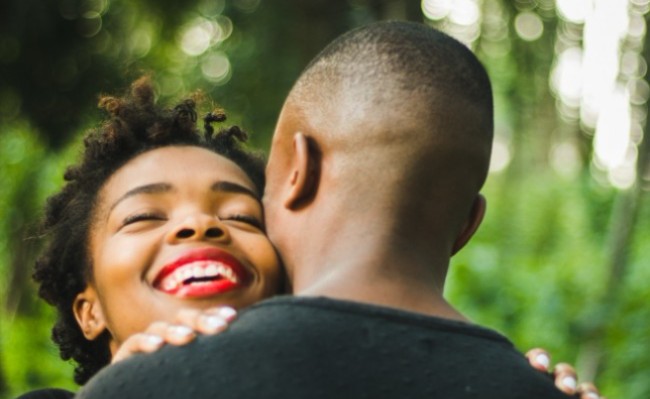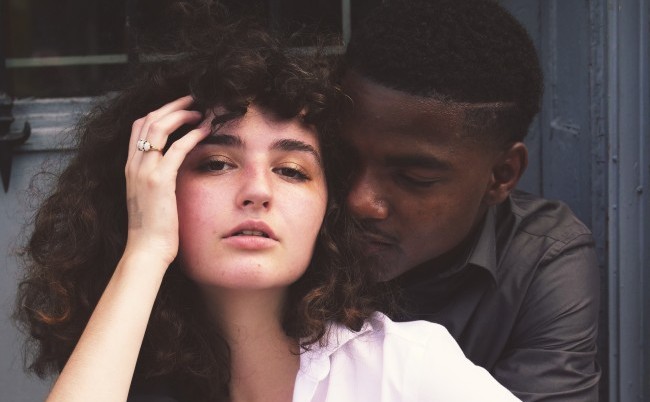
Here’s my favorite part of falling in love: There’s this instant when you realize that the person who you think is the most attractive person in the universe, who is the funniest, and the coolest, and the smartest person you know actually wants you back. Maybe it’s the moment when they go out of their way to brush their hand across yours — skin on skin contact sending little electrical charges up your body. Or maybe it’s when they lock eyes with you in the middle of a group conversation, and give a private little smirk. Or the way that they go out of their way to seek you out and then lean in when you make them laugh.
That feeling — when you can sense the room shifting and colors blurring to center around just the two of you — is one of the most addictive feelings in the world. It’s like a drug. You can’t help but crave the thrill of it. It’s a rush of joy that runs right through your veins.
We seek out that connection because love isn’t just emotional, it’s chemical. It’s the sensation of being changed on a physical level, every cell in your body rearranging to match someone else’s. The intoxicating way your partner smells… the gentle weight of their hand on the small of your back… the calming sound of their voice… all of it pulls you towards the other person like a magnet. When we fall in love, our brains and bodies are being altered as much as our hearts.
They say love hurts, but it also heals. And study after study shows that being in a long-term, healthy relationship with another person has positive impacts on our mental and physical wellbeing. As if we needed another reason to want to be in love, science tells us that having a partner has all sorts of physical benefits. Maybe love really is all you need.
Here’s what we know — scientifically speaking — about the crazy little thing called love:
Love can cure what ails you.

Being sick in front of your partner can be both a wonderful and terrible thing. Having someone to take care of you, bring you chicken soup and fluff your pillows, is lovely. But having that same person see you at your very grossest — when all you want is to impress them is not so fun.
When my partner and I were first dating, I came down with that kind of terrible flu where you cannot stop vomiting for 24 hours. My new boyfriend stopped by my apartment a couple of times to bring saltines, and make sure I was drinking water. Things were not pretty.
I would open the door, shaking, a pale, horrifying spectre of death who might suck out your soul dementor-style at any moment, and then I’d grab the tokens he’d brought roughly, and shove him out the door while screaming normal things like, “Don’t look at me, I’m hideous.” He’d leave, and like the Phantom of the Opera, I would skulk back into the shadows. Except, instead of melodious songs, it was the sounds of me retching and throwing up again that drifted to my one true love through the air vents. I don’t know why he’s still with me.
But I’m glad to have him. Science has shown that having a partner when going through an illness can actually improve your chances of getting better.
A study from the Cancer Prevention Institute of California looked at the data from nearly 800,000 people who were diagnosed with cancer in California between 2000 and 2009 and found that married people were more likely to survive cancer than single folks. Researchers tracked the subjects until 2012 and adjusted the data to account for factors like health insurance which could make a difference in the level of care and location which also could skew things. But even when you took those things out of the equation, they found that men who weren’t married were 22 percent more likely to die from cancer and women, 15% more likely than those with spouses.
It’s hard to pinpoint exactly why this is, but having a strong support system has been shown to have an impact on positive outcomes in serious illnesses. Things like being driven to and from doctors, being made healthy food, and simply lovingly cared for probably make a huge difference.
And being in a relationship doesn’t just help you recover from an illness. Chemicals released when in love may actually change how you experience the discomfort in that illness, reducing its severity.
A study at Stanford University tested this by scanning the brains of college students who said they were in love. They then subjected them to a small amount of pain, heat on the palm of their hands, and watched their brains’ reactions to the stimuli under different conditions. They found that when the subject looked at a picture of the person they loved (as opposed to an acquaintance), the pain was reduced by 40%. When the pain was more severe, the effect wasn’t quite as dramatic, about 15%. But still, love seems to be a natural pain reliever. So, staring deep into your lover’s eyes may be just as effective as popping a Tylenol because just the sight of true love makes us feel better.
Maybe we all should put a headshot of our significant others right over that chair that we always stub our toe on. We’d probably scream and swear less when it happened. Maybe. I mean…stubbing your toe really f**king hurts.
Love is a drug, but like…one that’s good for you.

I want you to want me
I need you to need me
I’d love you to love me
I’m beggin’ you to beg me
If you’ve ever thought that the lyrics of a love song would work just as well as the reason an addict gives for checking into rehab, then you aren’t wrong. A joint study from Syracuse University, West Virginia University, and a university hospital in Switzerland looked at brains of people in love, and researchers found that the euphoria we experience when in love affects us in a similar way to cocaine.
Love. It’s a helluva drug.
When you’re in love, 12 different areas of the brain work together to release things like dopamine, oxytocin, adrenaline, and vasopressin. Just like a narcotic would. It also (much like that hazy booze glow in which you think you’re way better looking than you are), affects our perception of our physical image.
Basically, love is a drug, and we’re allowed to get as high on it as we want. You can drive on it, operate heavy machinery, and the best part is that it’s extremely unlikely to show up in any mandatory workplace drug testing. Finally, a drug we can do that even Nancy Reagan can get behind.
It can prevent dementia.

When I think of love and memory, I tend to think of my grandparents bickering about details of events that they had totally different memories of (they were madly in love as long… as you didn’t get them started on the directions to anywhere).
“So, it was in 1968.”
“ ’67. ”
“It was 1968, BILL”
So, while I wouldn’t have thought that your long-term partner could make your memory better, a study published in the Journal of Neurology Neurosurgery & Psychiatry by University College London found that it did.
In the study, they discovered that people who never married were 42% more likely to develop dementia than those that coupled up. And while you could argue a correlation between the cognitive traits that make it less likely to marry (for example difficulty expressing emotion or communicating) and dementia, widowers still had an increased chance of the degenerative disease over those who lived with partners. The findings suggest that there is a link between living with a romantic partner and the prevention of memory loss. Unless you’re a character in Eternal Sunshine of the Spotless Mind, in which case love will definitely have the opposite effect.
Being in a healthy relationship can lower depression.

One important thing to note in all of these studies is that they tend to show benefits only if the person is in a relatively happy marriage or partnership. Volatile or unhappy relationships often provide the opposite result. So forcing yourself to be with someone you don’t like, not helpful.
But if you are with someone great, you’ll see quite a few benefits. Like with depression and the severity of its symptoms. For instance, a sociological study by a graduate student at Ohio State found that in over 3,000 people, who had been tested for and diagnosed with depression, those that later married, became happier.
The subjects were interviewed twice over a period of years. Those that got married in between interviews showed improvement in the degree of their depression and psychological well-being over those that were still single.
This may be slightly expected. Of course they felt happier. They got married! The surprise, however, came when the researchers compared depressed individuals who married with those that did not have clinical depression. The researchers expected that happy people would have more of an increase of feelings of wellness and psychological contentment in marriage than those who entered a relationship depressed. However, the opposite was true. Depressed people seemed to benefit significantly more than their less depressed counterparts in matrimony. They were happier.
It’s hard to say why this is, but it could be that the benefit of having support and companionship when struggling with depression makes marriage a far more positive impact than for those who enter a relationship struggling less. Love lifts us higher, as they say.
You’ll live longer.

Look, I’m still banking on my brain being transplanted into a stolen younger person’s body so that I’ll live forever. But, in case that technology is never invented and implemented (because it’s “wrong to murder people and steal their bodies so you can be forever young”), our best chance for living longer might be to find “the one.” The Harvard Journal reported a study of 127,545 American adult men that found that those who married, lived longer, and were in generally better health than those that never made it down the aisle.
This is because one major factor of longer life is your heart (the actual beating one, not the metaphorical one). In the US, heart disease is the leading cause of death in both men and women. One in every four deaths is heart-related. And marriage has a hugely positive impact on heart disease.
In a Framingham Offspring Study that looked at 3,682 adults over ten years, researchers found that being married decreased death by heart disease by 46% (even after adjusting for age, other diseases, weight, smoking, and blood pressure).
A partner may be more likely to help and encourage you to get to regular doctor appointments, eat better, and exercise. Although, in my household, marriage only seems to fuel ordering more pizza after an argument over whose turn it is to make dinner results in “FINE THEN NEITHER OF US WILL”. But I hear in some couples, they make healthier choices when together. That’s the word on the street at least.
It turns out, overall, that being happier leads us to live longer. And we’re really happy when we’re with the person we love most in the world. As an 80-year study at Harvard found, the biggest predictor of how long a person would live wasn’t their cholesterol levels, it was how many close and meaningful personal relationships they had.
“The surprising finding is that our relationships and how happy we are in our relationships have a powerful influence on our health,” director of the study, Robert Waldinger has said. “Taking care of your body is important, but tending to your relationships is a form of self-care too. That, I think, is the revelation.”
“Loneliness kills,” he continued in a TED talk about the subject, “it’s as powerful as smoking or alcoholism.”
So whether you’re madly in love this Valentine’s Day or not, it’s important to remember that close relationships (friends, family, romantic) are important to cultivate. We live longer when we have someone we love in our corner.
Find someone to hug this Valentine’s day. It might just save your life. Or at least, get you naturally high.






